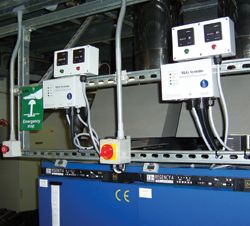Maximising boiler efficiency requires attention to detail. Tony Willis outlines the measures that will prove effective and those that could be an expensive mistake
With growing pressure to reduce energy consumption and carbon dioxide (CO
2) emissions, there is a renewed focus on increasing the efficiency of existing boiler plant. It is now commonplace to find the existing building management systems (BMS) being fully optimised and additional controls, such as weather compensation and sequencing, in place to deliver further control and savings. However, additional savings of 12 to 15 per cent can be achieved by focusing on further maximising the efficiency of each individual boiler directly even when these controls are in place.
Unfortunately, the drive to be green has resulted in unverified products and technologies being implemented with flawed control strategies that directly conflict with existing controls and compromise ambient room and hot water temperatures. So it is important that any retrofit solutions are thoroughly evaluated and, I would suggest, are introduced as part of a programme that includes the other measures discussed below.

Sabien M2G system at the IMechE's HQ in London
Maintaining the BMS: BMSs or building energy management systems (BEMSs) need to be regularly maintained, including re-calibration of sensors, or the readout on the BMS PC terminal may be inaccurate. It's also worth remembering that a BMS manages the building's requirements and typically doesn't control individual boilers, so each boiler should be optimised separately.
Most efficient boiler
Sequence the boilers: Most boilers deliver maximum thermal efficiency at 80 per cent of the boiler firing capacity, so it is important to ensure the minimum number of boilers is operating at any one time. Key areas to inspect include the motorised isolating valves (two-port valves) on each boiler to ensure they are working correctly. The most efficient boiler is the one that is not firing!
Regularly check boiler operating times: Check that time clocks are correctly set for required operating/occupancy times, with different settings for weekends and holidays and adjustment between GMT and BST. Building optimisation/weather compensation controls must also be correctly commissioned and occupancy times and sensors should be regularly calibrated.
De-scale the boilers and clean the flue-ways: Boilers with scale or sludge waste energy through reduced heat transfer efficiency so it's important to check for correct chemical dosing and for leaks that may result in untreated water continuously refilling the system. Flue-ways should also be cleaned regularly; dirty boiler flue-ways can decrease boiler efficiency by more than 10 per cent.
Ensure your temperature set-points are correct: Boilers and controls should be set correctly for the required demand, particularly with high-low burners where changing boiler set points to a lower value can result in comfort level issues. Hot water storage temperatures need to be within legal requirements.

The M2G fitted on a group of boilers
Check boilers are correctly designed for the application: Boiler plant should be correctly designed and commissioned for the application with close attention paid to service reports and combustion efficiency. When boiler plant is replaced the existing distribution system may need to be re-commissioned.
Understand the energy consumption: Sub-metering is essential for understanding energy consumption at individual plant level and measuring the benefits of energy improvement initiatives. Any analysis of energy consumption needs to be degree-day-corrected to include the impacts of weather conditions, as well as taking account of other variables.
Check for conflicts between heating and cooling: It's surprising how often poor space temperature control results in a space being heated and cooled at the same time. HVAC systems should be integrated so they work in harmony and avoid these conflicts.
Assess occupants' behaviour: Actions by a building's occupants, such as changing room thermostats, opening windows and altering timers for special events can have a serious impact on boiler/ system efficiency. Regular evaluation of such behaviours will prevent these actions going unnoticed for extended periods.
Prevent dry cycling: Boiler dry cycling is an inherent problem in all boilers of any size and age. Early attempts to overcome this created a predetermined firing period (time delays) or lowered the boilers' set points. These measures impacted on ambient room temperatures and comfort levels and potentially reduced hot water storage temperatures, increasing the risk of Legionella. Both measures will also conflict with existing BMS or weather compensation controls.
Real time control: In recent years technology has been developed to prevent dry cycling without reducing the boilers' set points or ambient room temperatures. It optimises the individual boilers in real time by analysing the thermodynamics of each boiler, rather than using predicted or historical firing patterns. By analysing real-time flow and return temperature profiles for each boiler, it differentiates between genuine heating demands and false demands created by standing losses that lead to dry cycling. This technology also integrates seamlessly with existing controls such as BMS, weather compensation and boiler sequencing.
Addressing dry cycling is a prime example of where it is necessary to thoroughly evaluate potential retrofit technologies to verify that they will indeed deliver significant energy savings and a return on investment. So an element of such an efficiency programme should include checking potential suppliers' track records, talking to other users of the technology and establishing that the supplier has the capacity to implement the project effectively.
• The author is technical sales director of Sabien Technology